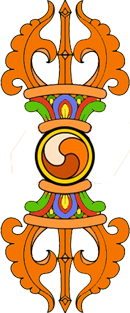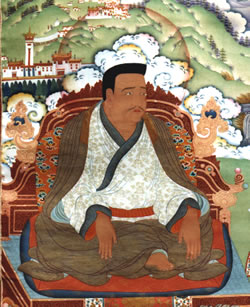


Marpa Lotsawa
Marpa traveled to India from Tibet at great personal peril across the Himalayas to study with his principal teachers, Naropa and Maitripa.
 Marpa Chökyi Lodrö, was born in Lhodrak Chukhyer to a well-to-do family. He began studying at a young age and was wild and untamed compared to other children. Marpa first received training for three years at Mangkhar with Drokmi Shakya Yeshe and mastered the Sanskrit language. He decided to travel to India to study dharma with renowned Indian buddhist masters. Marpa returned home to Lhodrak and converted his entire inheritance into gold for his travel expenses and to make offerings to his Indian gurus for requested teachings.
Marpa Chökyi Lodrö, was born in Lhodrak Chukhyer to a well-to-do family. He began studying at a young age and was wild and untamed compared to other children. Marpa first received training for three years at Mangkhar with Drokmi Shakya Yeshe and mastered the Sanskrit language. He decided to travel to India to study dharma with renowned Indian buddhist masters. Marpa returned home to Lhodrak and converted his entire inheritance into gold for his travel expenses and to make offerings to his Indian gurus for requested teachings.
Marpa’s travels to India
Marpa set out on his journey to India. Arriving first in Nepal, he studied with Paindapa and Chitherpa, two famous students of Naropa.
Later, Paindapa accompanied Marpa to Pullahari, near Nalanda University, where Naropa taught. Marpa spent twelve years receiving abhishekas, instructions, and studying with Naropa and other great Indian gurus to whom Naropa sent him to study or receive instructions. At the end of twelve years, Marpa offered a ganachakra and sang his first song of realization to his guru, Naropa. Shortly after, he set forth on his journey back to Tibet, where he taught and continued his dharma activities.
Subsequently, Marpa traveled to India two more times and studied with Naropa and other great mahasiddhas of India. Of these, his main gurus were Naropa and Maitripa. In total, he traveled three times to India and four times to Nepal. On his third visit, Marpa went through an adventure in finding Naropa, because Naropa, having already entered into the tantric conduct, was nowhere to be found. However, with determination, trust, and devotion, Marpa managed to find Naropa and receive the final teachings and instructions from him. At that time, Naropa prophesied that a family lineage would not continue for Marpa, but that his lineage would be carried on by disciples—especially one with the appearance of a monk and the inner realization of Mahayana. This prophecy foretold of the arrival of Lord Gampopa.
Bringing the complete Dharma to Tibet
Marpa now had received the full transmissions, so Naropa formally declared Marpa to be his dharma successor. Marpa brought the teachings and lineages of vajrayana and mahamudra back to Tibet.
Naropa in general had seven major disciples including Paindapa, Chitherpa, Shri Shantibhadra or Kukuripa, and Maitripa. His most well known disciple and lineage holder was the Marpa, the translator.
Upon his return to Tibet, Marpa spent many years translating Buddhist scriptures and contributed to the effort to bring the complete buddhadharma to Tibet. Many of his translations are part of the Kagyur and Tangyur.
Marpa continued to practice and give teachings, abhishekas, and transmissions to many students in Tibet. After his third visit to India, Mila Thöpaga or Milarepa became his disciple, who inherited his lineage in full. Marpa along with his wife, Dakmema and their sons lived in Lhodrak in the southern part of Tibet.
Marpa had numerous disciples. The four most outstanding students were known as the “Four Pillars:” 1) Ngok Chöku Dorje, who became the principal student to receive the transmissions and master the explanations of the Tantras, 2) Tsurtön Wanggi Dorje, who became the main student to receive the transmissions and master the practice of Phowa [transference of conciousness], 3) Meytön Chenpo, who became the primary student to receive the transmissions and master the practice of Ösal [luminosity], and 4) Milarepa, who became the principal student to receive the full transmissions and master the view, meditation, and conduct.
Marpa gave the full transmission of his lineage to Milarepa, who became his spiritual heir and continued the lineage of Naropa. The principal student and lineage heir of Marpa was Milarepa.
Statues of Marpa and his lineage holders
The Gyalwang Karmapa designed and built statues of Marpa, Milarepa and Gampopa, the founders of the Kagyu Lineage in Tibet, and presented them to all of the Karma Kagyu monasteries.




